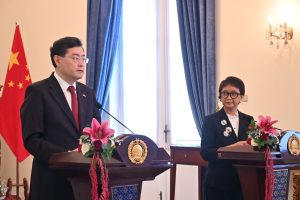China and Southeast Asian countries will intensify negotiations on a Code of Conduct (COC) for the South China Sea this year, Indonesian and Chinese officials said yesterday, amid continuing frictions in the economically important waterway.
The announcement came after Indonesia’s Foreign Minister Retno Marsudi met with China’s new Foreign Minister Qin Gang in Jakarta, part of the flurry of diplomatic exchanges and phone conversations that the latter has undertaken since taking the post late last year.
The COC is intended to reduce the risk of conflict in the South China Sea in the disputed waterway where China’s expansive “nine-dash line” maritime claim clashes with those of four ASEAN member states: Vietnam, Malaysia, the Philippines, and Brunei. Indonesia does not officially consider itself a party to the dispute, but the “nine-dash line” overlaps with a portion of Indonesia’s Exclusive Economic Zone.
Negotiations between ASEAN and China on the COC are scheduled to begin next month, which Indonesia, as this year’s Association of Southeast Asian Nations (ASEAN) chair, will be responsible for coordinating.
Speaking to reporters after her meeting with Qin, Retno said that Indonesia and ASEAN wanted to produce “an effective, substantive, and actionable” COC. Qin said that the two sides would work with other ASEAN countries to “accelerate consultations on the Code of Conduct (COC) in the South China Sea, and jointly maintain peace and stability in the South China Sea.”
The COC has been a perennial agenda item for China and ASEAN since 2002, when the two sides signed the non-binding Declaration of Conduct of Parties in the South China Sea (DOC), which committed all parties to ensure freedom of navigation and overflight and to refrain from “inhabiting the presently uninhabited islands, reefs, shoals, cays, and other features” in the seaway. Though the DOC has never been implemented, the COC aims to incorporate these principles into a binding framework for dispute resolution.
Next month’s negotiations will take place at a time of growing tensions in the South China Sea, despite the disputes being overshadowed to a certain extent by the war in Ukraine and the conflict in ASEAN member state Myanmar.
The Philippines in particular has announced that it plans to scale up its coast guard patrols of its Exclusive Economic Zone in the South China Sea, which in recent years has seen repeated incursions by Chinese coast guard and maritime militia vessels. (Indeed, Chinese coast guard patrols in disputed waters took place on a nearly constant basis in 2022.) In doing so, it has strengthened its ties to Western powers like the United States and Australia – both of which this week committed to establishing joint maritime patrols with Manila – to counter China’s assertiveness in disputed waters.
All this suggests that there is good reason to view claims of an impending breakthrough with some skepticism. As Collin Koh, a researcher at the S. Rajaratnam School of International Studies in Singapore told BenarNews earlier this month, recent Chinese actions – such as the alleged use of the “military-grade laser” against a Philippine Coast Guard Vessel on February 6 – will only undermine the trust necessary to overcome the politically charged disputes. “Recent instances of Chinese coercion at sea against its Southeast Asian rivals, such as Indonesia, Malaysia, and the Philippines, wouldn’t contribute to the building of trust,” Koh said.
It is also worth asking whether China benefits more from the status quo than it would from a binding agreement with ASEAN. Beijing has generally preferred dealing with the disputes bilaterally, which allows it to deploy its economic and military weight to maximum effect. All the while, its growing maritime power has allowed it to effectively reshape the contours of the disputes, through “patrols” in disputed waters and the construction of artificial islands in the Spratly Islands.
As a result, it would be surprising if a COC is completed in the next decade, let alone in the next year.

































